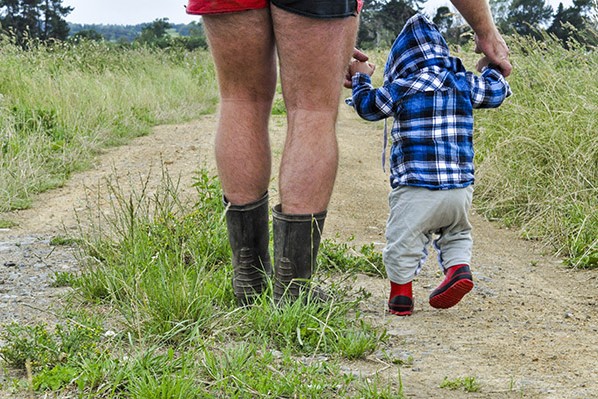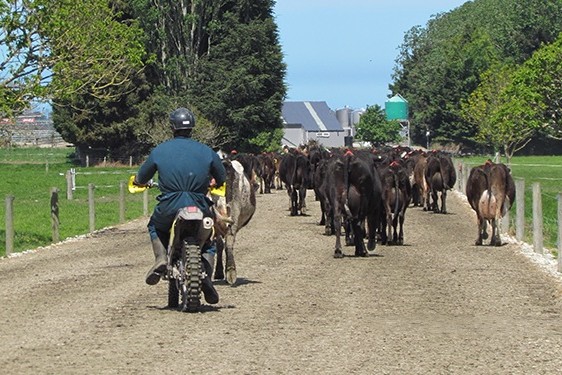Dealing with grief in your life and helping others deal with the loss of a loved one can be difficult. Harriet Bremner provides some tips.
Grief smacks you in the face. Hard. Nothing prepares you for the moment when you lose someone, nor the life that faces you moving forward. It is something that we, as humans, are all going to face at some point in our lives, it’s inevitable. However, we sweep it under the rug and pretend that it is not there. I believe this is because of how much it hurts and because as a society we have not learnt how to deal face to face with this particular elephant in our lives.
I wrote in my first column about the raw truth of grief and how it feels. Now I want to address how we, as people, deal with it when it comes rushing into our lives in an instant and how to support someone and navigate ourselves through this pain.
I have been recording Raw Truth podcasts and through chatting to others while they share their stories of loss, trauma, mental health and physical issues, we all agree – the conversation about grief must start.
No one tells you of the nightmares that haunt you all day and night, the physical toll the grief has on your ability to breathe or the inability to think or remember anything, just to name a few.
‘. . . We all go to funerals out of genuine love and respect for the person and their family but sometimes, days later, we find that we are back into the swing of our own lives . . .’
While everyone’s experience is extremely different, they all talk about how important it is to have people in your circle.
Support people who are there through thick and thin, who are not going to walk away when they outgrow your grief and who are not just there for the funeral.
It sounds harsh doesn’t it, but it’s true. We all go to funerals out of genuine love and respect for the person and their family but sometimes, days later, we find that we are back into the swing of our own lives and suddenly weeks or months have gone by without having given them a call or gone to see them. That’s one of the many things I have struggled with – the time clock. All you want to do is stop time because you cannot keep up with it, but it and everything else in life just continues to rush past you at lightning speed.This is one of the reasons we all need to have our own close knit group of friends who are our first layer and that is vital because they will still be by your side in years to come.
My group knows exactly who they are and are still with me 4.5 years later. There are people who disappoint you and vanish out of your life and people who surprise you with their actions. I used to feel upset and let down by the people who faded away but I now realise that this isn’t about me personally, this is about them and their own story in life.
The people who surprise you could be a perfect stranger that you come across two years later asthey e nter your life and end up being part of your circle. These friends, new and old are all crucial to your surviving this new life in whatever form that may be.
Speaking to my guests on my podcast, it became clear that we all tried to bury our grief at some stage, that walking out the door with a brave face seemed like the best thing to do at one time. This, we all agreed, catches up on you at some stage. So how do we learn how to live alongside our grief and walk with it rather than trying to hide it?
We learnt to surround ourselves with the right people and put ourselves first, no matter how it affected anyone else. If someone couldn’t handle this then they were someone that was only meant to come and go, in and out of your life, not stay in it forever. Again, it sounds harsh but some people are only in your life for a short time and others are there for a long time.
It is inevitable that your grief will come out at some stage and this is the scariest thing in the world. Looking back, my grief came out through back aches and headaches because I refused to let the tears flow. The one time I did break down in front of someone, it was so awkward that I told myself I wouldn’t do that again, simply to avoid making someone else feel uncomfortable.
We shut how we really feel down because society expects you to ‘move on’ and be better after a ‘suitable ‘ amount of time – this is bullshit!
No time limit
There is no time limit with grief. It rears its ugly head when and where it wants to and we should not hide how we are feeling simply because it may make someone uncomfortable.
One person told me a story about how they lost their sister at a young age of about 30. About six months later, they bumped into someone and got upset. The person asked them “who else died?”. When she told them that she was upset about her sister, the person said, “oh, I didn’t realise you had two sisters”. This is exactly why we need to normalise conversations around grief because we expect someone to be ‘better’ after time has gone past. These people may have not had significant loss in their life or they grew up in an era where you buried it. Through sharing stories and talking about loss we can hope to change the conversation.
Expect an honest answer If you are prepared to ask someone how they are, you must be prepared for an honest answer. I feel like the greeting; ‘hi, how are you?’ has become a greeting of just hello. I have asked people around me to ask me how are you today? This means that you are acknowledging that every single day is different and allows the person to feel like they can answer you honestly. When someone does share with you that they may be sad or not coping, please don’t shut them down.
You may be the first person they have been brave enough to open up to. So you must, in this moment, listen without judgement or comment and acknowledge how hard it must be for them.
It is their grief
Do not tell them you know how they feel because your dog died. Yes, this is also a form of grief but it is not the same thing, nor is your grandma dying. This is their grief at that moment and they need to live it. It is also not helpful to share stories about how other people you know died in the same way that the person they lost did. Keep those thoughts to yourself. Every single one of us has a grief experience and we cannot compare or take away from what someone else is going through – for each of us, our own story is the worst thing that we, personally, have been through.
Pushing people away
Some people may push you away when they are struggling – don’t give up! Asking them what they want you to do to help is a really hard question because the person themselves has no idea what will help – as the one thing they want back they can’t have. Arrive at their house, take some food, fill the woodshed, ring, message. Don’t expect a reply but know they love hearing from you.
“. . . We all go to funerals out of genuine love and respect for the person and their family but sometimes, days later, we find that we are back into the swing of our own lives . . .”
Harriet Bremner taking time out on her horse.
To hear Harriet’s podcasts about grief and trauma, head over to www.facebook.com/TRAWTRUTH or www.instagram.com/therawtruth_harrietbremner/





